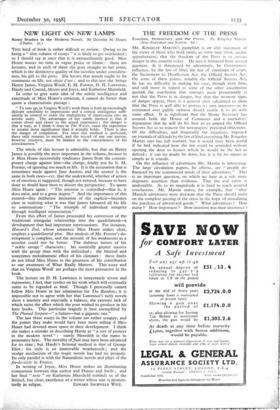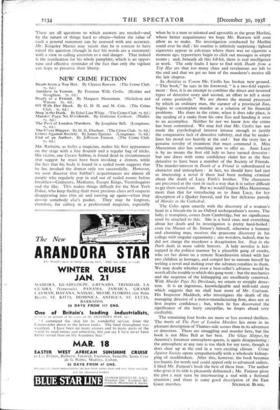THE FREEDOM OF THE PRESS Fascism, Democracy and the Press.
By Kingsley Martin. (New Statesman and Nation. 6d.)
MR. KINGSLEY MARTIN'S pamphlet is an able statement of the views of those who hold (with, as some may think, undue apprehension) that the freedom of the Press is in serious danger in this country today. He sees it menaced from several quarters. It is threatened by advertisers, by Government influence, by the law of libel, the law of contempt of court, the Incitement to Disaffection Act, the Official Secrets Act. On some of these points, notably the Official Secrets Act, he has no difficulty in making his case, though even here, and still more in regard to some of the other enactments quoted, the conclusion that emerges most prominently is not that the Press is in danger, but that the moment signs of danger appear, there is a general alert calculated to show that the Press is well able to protect its own interests—as its command over public opinion should enable it to do with some effect. It is significant that the Home Secretary has assured both the House of Commons and a journalists' deputation that he will do his best so to amend the Official Secrets Act as to remove the newspapers' principal objections. Of the difficulties, and frequently the injustices, imposed on journals of all kinds by the law of libel everything Mr. Kingsley Martin says has full warrant, but it would have been useful if he had indicated how the law could be amended without opening the door to licence which he would be the last to defend ; it can no doubt be done, but it is by no means as simple as it sounds.
On the influence of advertisers Mr. Martin is interesting. The large circulation papers, he affirms, are "greatly in- fluenced by the commercial needs of their advertisers." This is an important question, on which we hear as a rule more dogmatic assertion than evidence. That the evil exists is undeniable. As to its magnitude it is hard to reach assured conclusions. Mr. Martin states, for example, that "after Munich advertisers were insistent that the Press should insist on the complete passing of the crisis in the hope of stimulating the purchase of adverti sed goods." What advertisers ? How many ? How important ? How insistent was their insistence ? These are all questions to which answers are needed—and by the nature of things hard to obtain—before the value of such a general statement can be assessed with any accuracy. Mr. Kingsley Martin may rejoin that he is content to have raised the question (though in fact his words are a statement) with a view to calling attention to a real danger. That indeed is the justification for his whole pamphlet, which is an oppor- tune and effective reminder of the fact that only the vigilant can hope to preserve their liberty.



































 Previous page
Previous page